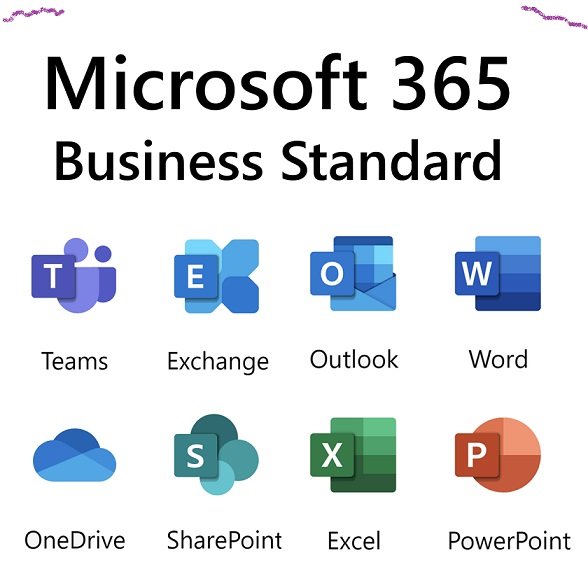sMicrosoft 365 Business Standard: An In-Depth Overview
Microsoft 365 Business Standards is one of the most widely used productivity suites by businesses across the globe. As part of Microsoft’s portfolio of business solutions, it offers powerful tools designed to improve efficiency, collaboration, and security. Whether you’re a small business owner, a team leader, or an IT manager, understanding the features, pricing, and benefits of Microsoft 365 Business Standard is essential for making an informed decision.
In this blog post, we will provide you with a detailed analysis of Microsoft 365 Business Standards. We will explore its features, pricing, benefits, and much more, giving you all the information you need to understand why it’s the right choice for your business.
Table of Contents
- What is Microsoft 365 Business Standards?
- Features of Microsoft 365 Business Standards
- Cloud Storage
- Microsoft Office Apps
- Email and Calendar Management
- Collaboration Tools
- Security and Compliance
- Microsoft 365 Business Standards Pricing
- Comparison of Microsoft 365 Business Plans
- Microsoft 365 Business Basic vs Standard
- Microsoft 365 Business Premium vs Standard
- How Microsoft 365 Business Standards Benefits Small Businesses
- Microsoft 365 Business Standards vs. Microsoft 365 Personal and Family
- Getting Started with Microsoft 365 Business Standards
- Integration with Other Microsoft and Third-Party Services
- Microsoft 365 Business Standards Customer Reviews
- Frequently Asked Questions (FAQ)
- Conclusion
- Disclaimer
1. What is Microsoft 365 Business Standards?
Microsoft 365 Business Standards is a comprehensive cloud-based productivity suite that helps small and medium-sized businesses streamline their operations. With a focus on collaboration, productivity, and security, it enables businesses to work efficiently from anywhere in the world.
This subscription-based service includes access to various Microsoft applications, including Word, Excel, PowerPoint, Outlook, OneNote, and Teams, all available across multiple devices. Furthermore, it comes with added benefits such as cloud storage, business-class email, and advanced security features to protect your data.
Microsoft 365 Business Standards is designed for businesses that need full-featured productivity software and cloud services, offering flexibility, scalability, and a robust platform for team collaboration.
2. Features of Microsoft 365 Business Standard
Cloud Storage (OneDrive)
Microsoft 365 Business Standards comes with OneDrive for Business, which provides each user with 1TB of cloud storage. This allows employees to store, share, and access files securely from anywhere, on any device. OneDrive is particularly useful for file synchronization and backup, ensuring that all files are securely stored and accessible at any time.
Microsoft Office Apps
Microsoft 365 Business Standard includes the latest versions of essential Office apps such as:
- Microsoft Word
- Microsoft Excel
- Microsoft PowerPoint
- Microsoft Outlook
- Microsoft OneNote These apps are available for both desktop and mobile devices, allowing users to work seamlessly across devices, whether in the office or on the go.
Email and Calendar Management
Business Standard subscribers enjoy business-class email powered by Exchange Online. This provides each user with a professional email address (e.g., yourname@yourbusiness.com), 50GB of mailbox storage, and the ability to send attachments up to 150MB. Additionally, the integration with Outlook ensures seamless calendar management, contact lists, and scheduling.
Collaboration Tools (Microsoft Teams and SharePoint)
Collaboration is at the core of Microsoft 365 Business Standards. Teams integrates well with other Microsoft apps, making it easy to collaborate in a shared document, create tasks, and manage meetings.
Moreover, SharePoint enables businesses to create, share, and manage content. SharePoint offers centralized document storage, team collaboration spaces, and advanced workflows for increased productivity.
Security and Compliance
Microsoft 365 Business Standard comes with built-in security features such as:
- Advanced Threat Protection (ATP): Protection from phishing, malware, and other email-based threats.
- Data Loss Prevention (DLP): Prevents sensitive information from being shared inappropriately.
- Mobile Device Management (MDM): Provides control over devices used within the organization, ensuring that corporate data is protected.
These features make Microsoft 365 Business Standards a secure and compliant solution for businesses of all sizes.
3. Microsoft 365 Business Standards Pricing
Microsoft 365 Business Standards is priced at $12.50 per user/month (as of 2024). This cost includes all the features mentioned above, making it an affordable solution for businesses looking to enhance productivity and collaboration while maintaining a high level of security.
Microsoft also offers an annual commitment option, which reduces the per-user price slightly and provides more value for businesses that are confident in their need for the service over a longer period.
4. Comparison of Microsoft 365 Business Plans
Microsoft offers several plans under the Microsoft 365 umbrella, with Business Standard being one of them. Here’s a comparison of the Microsoft 365 Business Basic, Business Standard, and Business Premium plans:
| Feature | Microsoft 365 Business Basic | Microsoft 365 Business Standard | Microsoft 365 Business Premium |
|---|---|---|---|
| Microsoft Office Apps | Web & mobile versions only | Full desktop & mobile versions | Full desktop & mobile versions |
| Email & Calendar | 50GB mailbox | 50GB mailbox | 50GB mailbox |
| Cloud Storage (OneDrive) | 1TB per user | 1TB per user | 1TB per user |
| Microsoft Teams | Yes | Yes | Yes |
| Security & Compliance Features | Basic security features | Advanced security features | Advanced security features with more control |
| Price | $5 per user/month | $12.50 per user/month | $20 per user/month |
As shown in the table, the Business Premium plan offers more advanced security and device management features, making it ideal for businesses with higher security needs.
5. How Microsoft 365 Business Standard Benefits Small Businesses
Small businesses stand to benefit significantly from Microsoft 365 Business Standard. Here’s how:
- Scalability: As your business grows, you can easily add more users without needing to worry about infrastructure or software management.
- Cost-Effective: For a low monthly fee, businesses get access to a range of enterprise-level tools that would otherwise be expensive to implement.
- Cloud-Based Access: Employees can work from anywhere, anytime, with full access to documents, emails, and collaboration tools.
- Collaboration and Communication: With Microsoft Teams and SharePoint, businesses can improve communication across teams and manage projects more efficiently.
- Security and Compliance: With built-in security and compliance tools, businesses can rest assured knowing that their data is safe from external threats.
6. Microsoft 365 Business Standard vs. Microsoft 365 Personal and Family
While Microsoft 365 Business Standard is designed for businesses, there are other Microsoft 365 plans aimed at individual consumers, such as Microsoft 365 Personal and Microsoft 365 Family. Here’s how they differ:
| Feature | Microsoft 365 Personal | Microsoft 365 Family | Microsoft 365 Business Standard |
|---|---|---|---|
| Target Audience | Individuals | Families | Small businesses |
| Microsoft Office Apps | Full desktop & mobile versions | Full desktop & mobile versions | Full desktop & mobile versions |
| Cloud Storage | 1TB OneDrive | 1TB OneDrive | 1TB OneDrive |
| Email & Calendar | Not included | Not included | 50GB mailbox |
| Security Features | Basic security | Basic security | Advanced security |
| Price | $69.99/year | $99.99/year | $12.50 per user/month |
7. Getting Started with Microsoft 365 Business Standard
Getting started with Microsoft 365 Business Standard is easy. Simply follow these steps:
- Sign Up: Go to the official Microsoft 365 website and choose the Business Standard plan.
- Create an Account: Create your business account, add users, and configure your settings.
- Install Office Apps: Download and install the Office apps on your devices.
- Start Using Teams & SharePoint: Begin collaborating with your team via Microsoft Teams and SharePoint.
- Secure Your Account: Set up multi-factor authentication and other security measures.
8. Integration with Other Microsoft and Third-Party Services
Microsoft 365 Business Standard integrates seamlessly with a range of Microsoft services, including Azure Active Directory, Power BI, Microsoft Dynamics 365, and many others. Additionally, it also works with third-party services, allowing businesses to create customized workflows and streamline their processes.
9. Microsoft 365 Business Standard Customer Reviews
Many customers have praised Microsoft 365 Business Standard for its powerful features, ease of use, and excellent customer support. Small businesses, in particular, find it highly valuable for improving team collaboration and ensuring secure access to business-critical data.
10. Frequently Asked Questions (FAQ)
- Is Microsoft 365 Business Standards suitable for large businesses? Larger enterprises may require Microsoft 365 Enterprise plans with more advanced features.
- How does Microsoft 365 Business Standards compare to Google Workspace? While both services offer productivity tools, Microsoft 365 Business Standard provides more extensive desktop app access, better integration with Microsoft tools, and advanced security features.
11. Conclusion
Microsoft 365 Business Standard’s is a robust, cost-effective solution that provides businesses with all the tools they need to succeed in today’s digital landscape. From cloud storage and security features to collaboration tools and email management, it offers an all-in-one package that can significantly enhance productivity, collaboration, and security within an organization.
12. Disclaimer
The information provided in this blog post is for general informational purposes only. Prices, features, and availability of Microsoft 365 Business Standards may change over time. For up-to-date details, please visit the official Microsoft website or contact Microsoft support.




